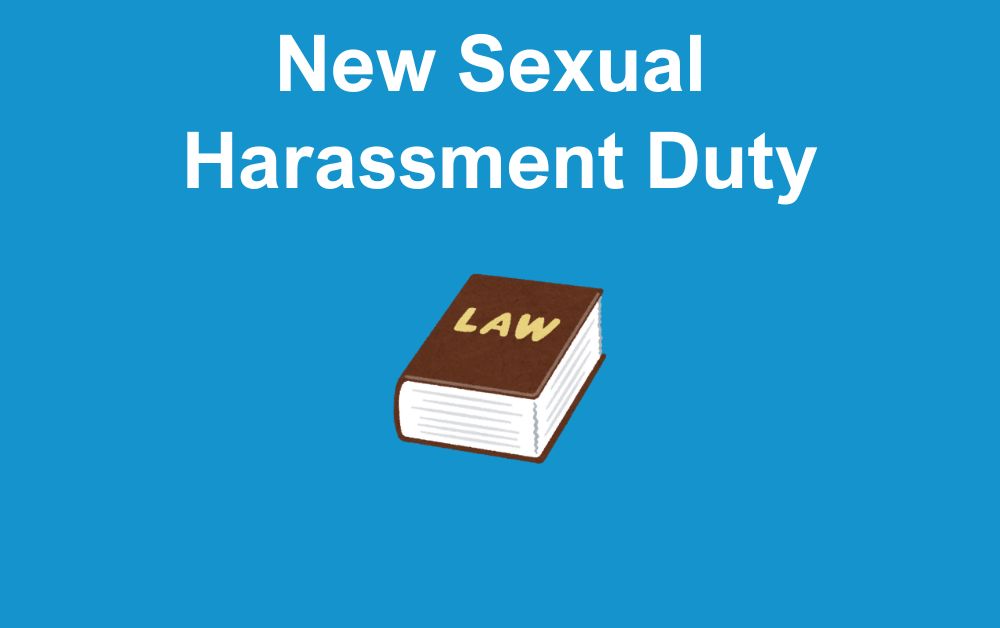The new sexual harassment duty is set to come in to force on 26th October 2024. This will mean employers have greater responsibilities to “take reasonable steps” to protect their employees from sexual harassment. This shifts the burden from reactive measures, where employers dealt with complaints after incidents, to preventative measures aimed at stopping harassment before it occurs.
With this new law on the horizon, it is critical for businesses to reassess and update their policies. This is essential to ensure compliance and avoid potential legal ramifications.
Key Changes Under New Sexual Harassment Duty
Employers can now be held accountable by the Equality and Human Rights Commission unless they can show that they took all reasonable steps to prevent sexual harassment in the workplace. Furthermore, tribunals will have the right to increase compensation up to 25% if it’s proven the employer has breached the new rules.
Employers are still not held liable for sexual harassment of their staff by third parties. However, under the new duty, they will be in breach if they fail to take proactive preventative measures.
Equality and Human Rights Commission
EHRC are Britain’s independent human rights and equality regulator. Their main responsibility is to protect everyone’s right to dignity, fairness and respect. They uphold the Equality Act 2010, which prohibits discrimination or harassment against individuals based on the nine protected characteristics. They’re also the primary point of contact for policymakers, public sector organisations, and businesses seeking expert guidance on equality and human rights law.
The Equality and Human Rights Commission (EHRC) will play a critical role in the enforcement and guidance surrounding the new sexual harassment duty. As the regulator of equality and human rights law in the UK, the EHRC will provide authoritative guidance to help employers understand their legal responsibilities and ensure they take proactive steps to prevent this.
Preparing for the Changes
To comply with the new legal requirements, employers need to take decisive action to review and update their workplace policies, training programmes, and reporting procedures. Below are key steps employers can take to ensure they are prepared:
Sexual Harassment Policy
Employers should review their existing policies to ensure they align with the new legal obligations. Policies should clearly define what constitutes sexual harassment, and outline how employees can report incidents.
If you don’t currently have this policy in place, we encourage you to prioritise this. This should clearly define what constitutes sexual harassment, including examples of unacceptable behaviour such as verbal, non-verbal, and physical actions. It should outline the organisation’s zero-tolerance stance and emphasise that harassment will not be tolerated under any circumstances, whether it occurs in the workplace, at work-related events, or involves third parties such as clients or contractors. The policy should also detail the procedures for reporting harassment. This should include how and where employees can raise concerns confidentially, and the steps that will be taken to investigate complaints. If you would like our help to create a comprehensive Policy, feel free to contact us.
Risk Assessment
Once part of law, risk assessments will be required to identify areas where employees may be at risk of harassment. This can include reviewing interactions with clients, external stakeholders, and other third parties, especially in customer-facing roles or industries with high levels of third-party contact. Following this assessment, employers should implement appropriate controls and preventative measures to mitigate these risks.
Company culture set by managers
A key factor in the success of anti-harassment initiatives is the commitment of senior leadership. Leaders should actively promote a culture of respect and zero tolerance for harassment. They should also ensure that managers and supervisors are trained to deal with complaints effectively. Having leadership actively involved in these efforts will help to set the tone across the organisation that sexual harassment will not be tolerated.
Management Training
Training is a vital tool for ensuring that all employees understand what constitutes sexual harassment and how to address it. Employers should provide mandatory training on workplace behaviour, equality, and diversity. This should include real-life examples, and interactive workshops to help employees recognise and prevent inappropriate behaviour. Training should be regularly refreshed, and records should be kept as evidence of compliance.
Our team regularly supports clients by providing management training on preventing and addressing sexual harassment in the workplace. We equip managers with the knowledge and skills needed to recognise, respond to, and prevent inappropriate behaviour, ensuring they understand their responsibilities under current legislation. With the upcoming changes, we are well-positioned to help your organisation comply with the new requirements. It’s our priority to create a safer, more inclusive environment for all employees.
Strengthen Reporting Mechanisms
A robust reporting mechanism is essential for encouraging employees to come forward if they experience or witness harassment. Employers should ensure that employees know how and where to report incidents of harassment. It’s essential that these channels are confidential and accessible. Policies should also guarantee that no employee will face retaliation for making a report.
Investigate Complaints Promptly and Fairly
When complaints of sexual harassment arise, employers must act promptly to investigate and resolve them. Investigations should be handled by trained personnel, and the process should be transparent, impartial, and documented. Employers should also be prepared to take swift disciplinary action when harassment is confirmed, up to and including termination of employment, where appropriate.
Conclusion
The new sexual harassment laws represents a pivotal moment for employers to reassess their responsibilities in protecting employees. By updating policies, providing training, and ensuring a strong commitment to preventing harassment, employers can create a safer, more supportive workplace culture. It is crucial for businesses to take proactive steps now, not only to avoid legal penalties but also to foster a positive and respectful work environment for all.
Employers should seek legal or HR advice if they are uncertain about how the new legislation affects them. This is essential to ensure full compliance and avoid costly litigation.







